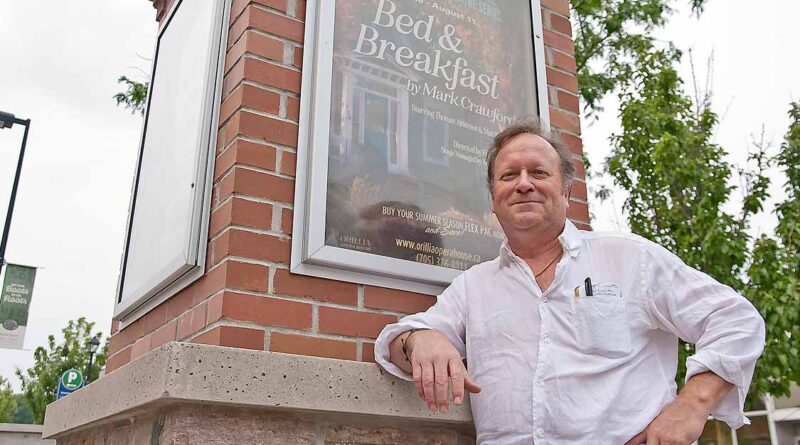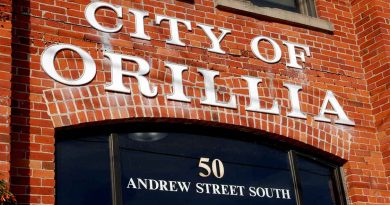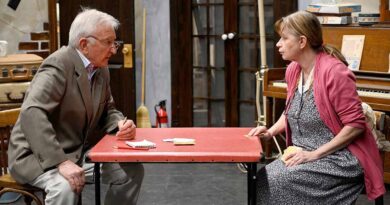The Play’s The Thing
By John Swartz
The graph of success and health of summer theater in Orillia resembles a drive through Missouri; up and down long gentle hills, broken occasionally by a great valley stretching out before you and the sight of a great ridge to reach way off in the distance.
There have been some great seasons over the last 30 years, some so-so with some good and some not so well done plays. Of course, that’s from the perspective of a critic. The business side of theater is relevant and understood, but when it comes down to it, are the plays good, well performed, exciting, and dazzling
The last two seasons, the product on stage in total have been exceptional.
You’d think a lineup of great plays would guarantee a successful season, but that wasn’t always the case and back in the Sunshine Festival days featuring annual budget deliberations which were a roller coaster of accusations over Opera House budget deficits (even though the Sunfest technically wasn’t a City property).
Can we remember a little play called Jesus Christ Superstar from 2005? In a season of four plays, that one was without question the best summer theater play ever produced by the Sunfest – and no one went to see it. Lousy ticket sales not only killed the season (the other three play’s gates exceeded production costs) it killed the entire theater company.
A series of subsequent regimes had a series of quick takeovers and vision changes. Lots of hard work recovering from perceived troubles and rebuilding audiences was expended. The big room, Gord’s Room, fell out of use as the scene of grand plays with big casts and almost full opening night audiences in favour of using the 100-seat Studio Theatre.
The New Era
Enter the team of Wendy Fairbairn as the new general manger of the Opera House and Jesse Collins as the artistic director of the summer theater program in 2015. They had to hit the ground running because the change happened well into the 2015 season (it’s not just the summer months; for example, 2024’s season starts in September with planning contracting and designing).
After the Sunfest, the Opera House got out of producing plays and was buying them from other companies. The 2015 season had 4 such plays already in the pipeline when the change in management happened. Then they were told 2 of the plays they thought they were getting weren’t able to be produced. An emergency phone call from Wendy to Jesse was added to the script.
Jesse has been in the theater business for 40 years. He co-owned a company in Mississaga (Harbourside Playhouse, Port Credit) and the first person they hired turned out to be Wendy Fairbairn’s niece. Wendy used to work at the Meadowvale Theatre (Mississauga) at the time.
“When she (Wendy) found herself in a situation she needed a show built rather quickly, she gave me a call,’ Jesse said.
“There were two other shows that came in that were built somewhere else. It was a real transitional year. Everything was happening at the last minute; “(Wendy said) a theater was supposed to provide plays for us – they can’t do it, can you quickly build two shows for us?” We have no team, no nothing. I said, “yeah, as long as I get to program the next season,”” said Jesse.
Those plays Jesse built from the ground up were Ladies Foursome and Outlaw. From there it’s been a steady progress to what has been two fantastic years of theater-going, and arguably four considering the truncated 2020 and 2021 seasons.
“I always use the analogy of baseball managing; you go into an organization, sometimes you have go in, in a hurry. There’s only so much you can do when you go in, in a hurry. Then you begin to retool to build a team that works shoulder to shoulder with you. The more you are able to refine the team to share the vision of what you want to do – I think that’s the sensation you are getting,” he said about all the pieces falling into place for success critically and on the financial statements.
“Everything was moving pretty quickly at that time. That wasn’t a situation where I had the typical amount of pre-production you might have on a season for reasons that were out of anybody’s control.”
Indeed. Ladies Foursome didn’t click with this reviewer, and Outlaw was a big miss, but they sold.
“I directed (elsewhere) the world premiere of that show (Ladies Foursome). That show has gone on to become, arguably, the most produced and most successful of all of Norm Foster’s plays – with that cast,” Jesse said.
“I’ll grant Outlaw, the other play we did, that was a play I did not program. It’s not a play that I’m sure I would have programmed.”
On paper, success is measured by the number of seats sold (as a percentage of all seats available), which translates to dollars. It’s a crap shoot, there is a lot of pressure to choose the right plays audiences will want to see. Sometimes that surefire hit fails (e.g. Superstar) no matter what you do.
“I’ve always said it takes 3 to 5 years to get momentum. The first couple years you are testing the water,” Wendy said. Year one the season sold at 75%. “By the fourth year we were at 87%. Then we had two years of COVID.”
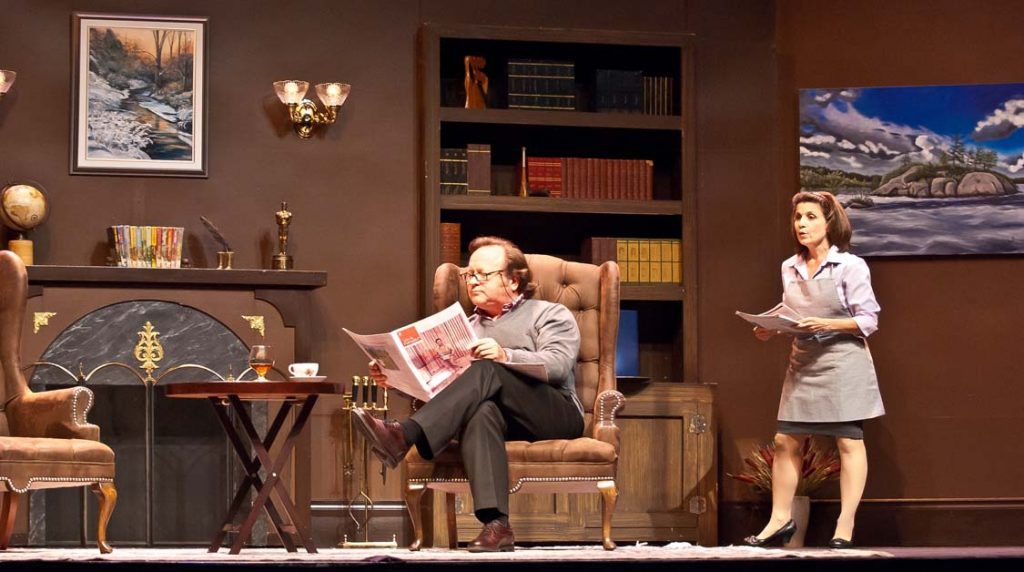
In 2020 there was only one play offered, On A Fist Name Basis, which had only a 64% uptake.
“We were first Equity (union) theater company in Canada that performed inside during COVID. The city was very supportive. A lot of municipal theaters closed their doors during COVID. We were lucky in the sense we have the two spaces. We moved a production that should have been in the 100 seat theater up to a large space,” Wendy said. That allowed social distancing for patrons.
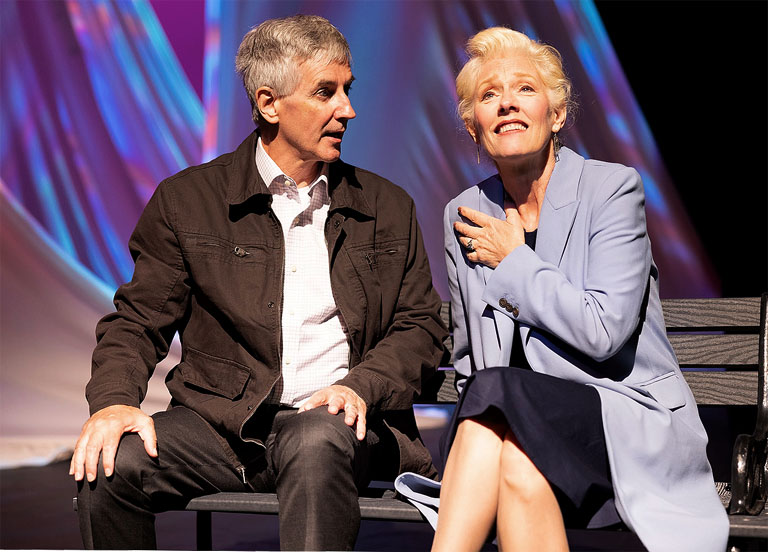
In 2021, again only one play, Old Love, sold at 90%. 2022 fell a bit, but still in the range of pre-COVID to 85%. Then came this year. So far, ticket sales have been at 98%.
A return to semi-normal in 2022 still left a lot of questions unanswered. One being, would people want to entertain themselves in places with lots of other people, or did habits changed? Jitters at the beginning of the season made Jesse and Wendy play it safe and mount the first play in Gord’s Room where people could sit with a buffer of empty seats around them.
“When we set up to do the shows, At the end of August, first of September in 2021 we were planning for our 2022 season, we didn’t know where the world would be, so we said we’re going to throw it upstairs because we have to kind of prepare,” Wendy said.
“Last year was a bad year for a lot of the summer theaters. Some of the people we have comparable shows with, its only hitting 50 to 60%. We were able to prepare a little bit more because we did do shows in 2020 and 2021.”
Programming A Season
While marketing plays a big role in getting audiences, if you have nothing to sell marketing means nothing. So a lot rests on the plays chosen for each season and that is Jesse’s department.
“Programming is always tough; you have to go by the data. What the data shows is with the choice of plays, each year our audience has grown. I inherited an audience that had about 20 people coming to a show. Every year that audience grew. What that tells me is that the choice of plays is actually a large part of that. That’s not happening by accident.,” Jesse said.
“I’m not here to do the plays I want to do. Frankly, I’m not here to do the plays that you (the critic) want to do. We’re going to do the plays the audience wants to see.”
“I’m the guy who provides them with the entertainment and amusement they want to have in their life. We kind of provoke a little thought somewhere along the way and I try to push the boundaries here and there of what they see and experience, but for the most part it’s about them. It’s their theater.”
He used a philosophy that has served well since that first season.
‘Once I began to program the next season, the model I used was, I wanted to do shows that I knew worked – what I refer to as the Swiss watches of our business – shows I had done before at other theaters that I knew were successful. What I saw was audiences loving them, enjoy them, and then buying tickets to the next one.”
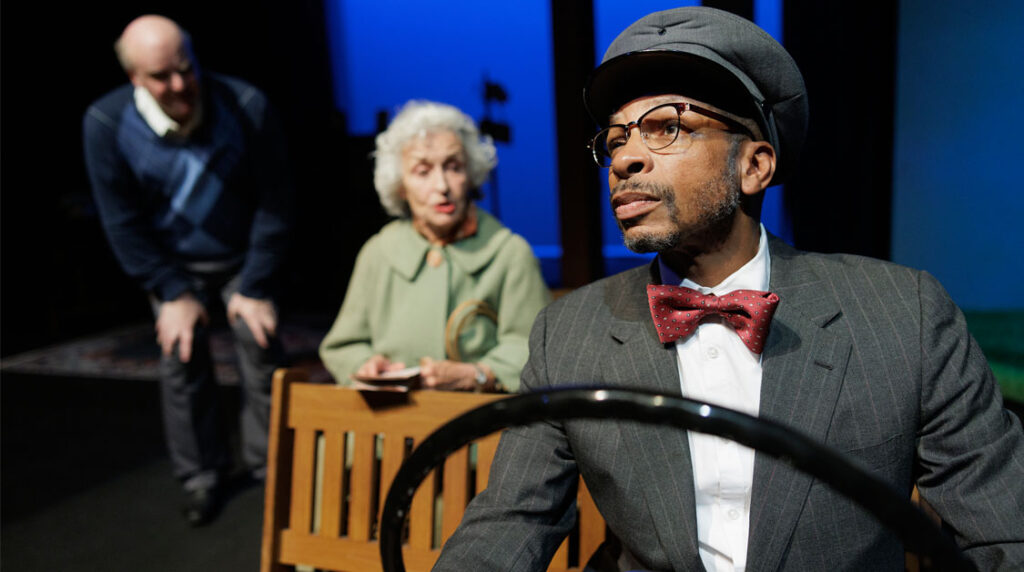
“Wendy and I decided we’d do two newer, commercial successes and one classic. I was doing things like Last of the Red Hot Lovers, Neil Simon plays, Driving Miss Daisy, things that had a certain marquee value that people would look at the title and say, “OK, I’m familiar with that.””
“The combination of those two things is what we were attempting to do and we are continuing that.”
You might have noticed another name throughout this read, Norm Foster’s. His plays have figured prominently in programming all along, but more so lately.
“What happened was sometimes it coincided that Norm had a new show that I thought was a Swiss watch, and then there were also the classic Norm Fosters that he wrote back when he and I were starting out and working at the same theaters when we first became friends. There were certainly plays he wrote that endured and they’ve endured for a reason because they established themselves as Swiss watches. “
“I may do the same next year. I might do an older Norm Foster and a newer one and a classic.”
This is smart. The exposure to Foster’s work has created a case where it doesn’t matter what the title of a play is, or what it’s about, or if it’s a comedy, for this writer it’s, is it a Norm Foster Play? OK, I’m there. It seems one would have work very hard to screw up a Norm Foster play when all one has to do is follow the script.
“You’d be surprised. That’s the common misconception with Norm. Very good directors have screwed them up, and I’ll tell you how – if you begin to think you are smarter than the play and you start tinkering with it,” Jesse said. “Everything is done with a wink in their eye and it wrecks the whole thing.”
The thing with Foster’s plays has been noted several times in reviews appearing in SUNonline/Orillia; we, the audience, know people just like those in the plays. They do things we have witnessed, and made the goofs and slips we have all made at one time or other. Foster just assembles those common experiences into a narrative with a satisfying goal, an end, that pleases, and along the way we laugh a lot.
“When people watch a Norm Foster play, they see themselves reflected on the stage,” Jesse said.
Marketing
Back in the glory years of the Sunfest, there would be four or five highway coaches lined up on West Street in front of the Opera House on show days – all bring patrons to see a play. You can still occasionally see a bus in the vicinity, but it’s not as common anymore.
That was a function of trying to fill a 700 seat theater. That’s not necessary now the Studio Theater is the venue. The marketing plan then was the brainchild of David Fanstone. He called it the Sunshine Getaway Package, and it included a cruise on the Island Princess, a tour of the Leacock Museum, an overnight stay and some meals.
The Sunshine Getaway still exists. It even has its own website. The Island Princess obviously is not part of the deal, but the rest remains (at $225 per person). They even farmed out promoting the packages to other organizations Like Orillia’s Lake Country, hotel participants and several online travel/trip groups. Instead of bus operators being the chief agents, people are booking their getaways on their own.
“The challenge with bus tours you have to really develop a large team to market and compete for those things, which if fine and it’s doable,” Jesse said.
“The typical bus tour has 40 some odd people on it. They have sort of a trigger date where they can cancel, and they often do. They call a month out from the show and say, “we didn’t get enough people signing up so we’re not going to come.” Now you’re left holding these 40 tickets. That’s half your house when you’re in a 100 seat house.”
“You’re also discounting those tickets (to the bus company). So we thought of a different thing – what if we create the tourism model where we individually sell people on the Sunshine Getaways? Then they are going to come and they’re going to stay at the hotel and they are going to eat at Era 67 and they are going buy things in the stores. They are not just arriving on a bus, disembarking, watching the show and bye-bye.”
“My choice is to operate out of the Studio Theatre. The reason is twofold. I love the big theater, it’s fantastic, but if you are going to operate in the big theater at 600 seats a throw, you’re going to churn through your audience very quickly and your run is going to be short, or it’s not going to be profitable. The most important reason is that in the studio the theater experience is very different than a proscenium where everybody is far back and you need a massive show. The kinds of shows I want to do that have proven successful are smaller shows that exist in a room, a small room, crammed with people.”
“The people that are buying those (packages), has probably tripled over the past two years. That has to do with the reputation we are building in the broader theater community.”
Another marketing item is bundling tickets to the plays. Using the Flex Pac one can get tickets to all three shows, or multiple tickets for combinations of shows, at a discount. The target audience has shifted from the GTA.
“We’ve done various marketing. We’ve been on CTV and that brought in quite a few people. This summer we went north instead of south, we went all the way to North Bay and Sudbury. Our biggest thing is someone who bought a Flex Pac then tells two other couples what a great deal it is. We had one Getaway package that had 16 people coming, 8 couples all coming to the show because one couple came in here last year,” Wendy said.
“Word of mouth is our biggest thing. We do a lot of Facebook, our demographics are definitely Facebook users (as opposed to Twitter, Instagram). I sent out a thing about the opening night and I’ve already had 15 to 20 people share it.
Jesse builds the shows and Wendy manages the other things with one more thing in mind. Selling the shows to other theaters. Since the Christmas productions in the years preceding COVID, they have sent Opera House plays out on the road – sets, actors and costumes – to be performed in other theaters. These plays make money even after they close here.

“We’re touring Bed and Breakfast to Brampton this year. We have done anywhere from 9 other locations. This year was a little quieter. Last year all three of our shows went to other theater spaces. It varies from year to year,” Wendy said. This strategy has also resulted in drawing people to come to Orillia to see a play.
“By the Orillia Opera House touring out shows to the GTA area, a lot of the people that come up to Orillia on the Getaway packages, originally saw the Orillia Opera House quality shows in their own town theater and said, ‘That’s a great show,” and it made Orillia known to people in the theater world.”
What makes them attractive is again, the quality of the production.
“This one (the recently closed Bed and Breakfast), we have arguably one of the best casts and director in the country – Fiona Sauder. Her last production at Soulpepper Theater a few months ago just won 6 Doras, including one for best director. That show moves from here and goes to the Rose Theatre in Brampton and runs there for two weeks after it finishes in Orillia. Those kinds of things raise our profile throughout the province,” Jesse said.
“They pay us to take them there. And when they are there, if you go to their website it will say the Orillia Opera House production of Bed and Breakfast. Two things happen, revenue comes in and reputation goes up.”
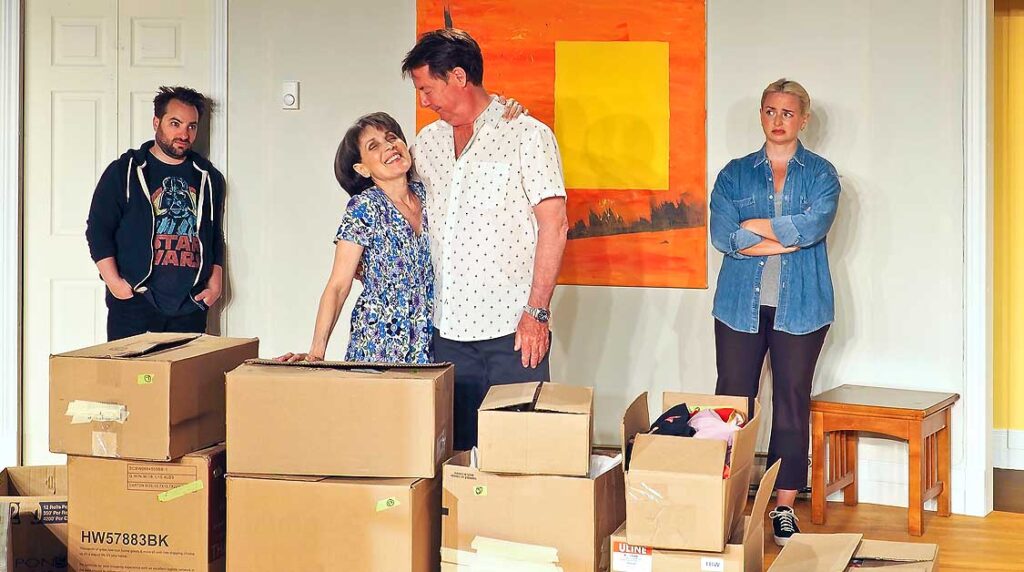
Audiences in Oakville Brampton, Mississauga, Burlington and other places have seen these plays. And it works there other way too – with the Opera House involved too. The first play this year, Moving In was a co-production with the Upper Canada Playhouse in Morrisburg, Ontario. It also was a world premiere of Norm Foster’s latest comedy. While Upper Canada got the honour of having it first, by the time it got here the bugs had been worked out.
“The first run through with an audience with Moving In; we’re listening, we’re gauging, we’re seeing where the laughs are and how they are responding to it, and right as soon the lights go to intermission, he (Norm Foster) leans over and says, ‘’I was worried about this one.” And it turned out to be the best he’s done,” Jesse said.
What’s Next
Working with the Mariposa Arts Theatre is something Jesse hopes to continue. MAT has a workshop where sets can be built, and a nice collection of set pieces and wardrobe too.
“Mariposa Arts Theatre has become such an ally. It’s not measurable the amount of support they have given us and we’ve tried to give them. It’s one of the most important relationships that I have,” Jesse said.
They also have people Jesse would like to incorporate more than he already has.
I work shoulder to shoulder with Brian Halbot every day and he is a one-man idea machine. He’s amazing. That guy is a theater guy through and through. I’d go to any theater in this country, if I had the opportunity, I’d have him and Ashley Witten who is our production manager and has been my right hand at the theater the past five years, I’d take those two people to any theater in the country and that’s where they belong.”
What has been missing to some degree are the big cast, big showpieces like what used to happen in Gord’s Room. Plays like West Side Story (hint), or Wicked, or anything new that is well-known.
“I know how to do big shows and you may see at some point we may make a decision to go upstairs and do something big. It might be West Side Story. That time will come, but I want to time it when it’s financially prudent. We’re building a foundation, and that foundation is to become known across the province as having quality theater, with very good people, a beautiful town to experience,” Jesse said. If one of those big cast productions does materialize, Jesse thinks he’ll have to tap into MAT’s corps of actors as well.
There are a couple reasons why big cast productions have disappeared. Payroll is one of them, housing all the actors is another; Airbnb isn’t just wrecking the housing and rental market in general, it’s making theater more expensive to produce.
“That’s’ something we’re going to be looking at closely next year because we obviously have to put more resources towards that, and are we going to be able to do it?” Jesse said. “We don’t get grants. We’re not designed for that. We’re designed to make the money we spend and be fiscally responsible with it.”
On the casting side, many well-known plays often have small casts, which are perfect for the Opera House. Other than this year, the middle play of each season has been a recognizable title, something by Noel Coward, Neil Simon, or such.
“Driving Miss Daisy (2022 season), everybody thinks “oh, the big movie, Broadway,” was originally done at a theater called Playwright’s New Horizons in New York in the mid 80s in a theater that was not unlike the Studio Theatre you just watched Bed and Breakfast in,” Jesse said.
So not next year, but sometime soon, the eye is on returning to Gord’s Room for a blockbuster – when the finances and data say it’s time.
One thing that will change in 2024 is how many opportunities to see each play audiences will have. The Sunfest’s opening night was a Saturday and they regularly had Saturday performances
“If we were able to do that (this year) we would have sold at least another 350 tickets for Moving In alone,” Wendy said.
“We increased our seating availability. In 2015 we had 4,000 (seats on the season), we currently are at 5,100. Next year we are adding 400 per performance. Percentages are good, in 2024 we’re going to be sitting at over 6,000 seats.” That translates to 4 more performances of each play.
And there will be Foster on the menu.
“We love Norm Foster and our clients love Norm Foster. Believe me we aren’t changing that formula because we get told every time. His stories tell what the people are feeling. None of the shows we produce are heavy. We’re not doing Glass Menagerie or Cat On A Hot Tin Roof, we’re not doing those dramas, we’re just light.”
Needless to say, Jesse is happy the things he’s doing are working.
“We wouldn’t be doing it if we ever showed up as a big line item, a big draw on the City’s finances, that’s what we’re designed not to do and that’s what I think we’ve been successful doing.”
“I am just grateful and absolutely so humbled and blessed to be at the right place at the right time.”
(Photos by Swartz – SUNonline/Orillia and Supplied) Main: Orillia Opera House summer theater artistic director Jesse Collins

